
This is a collection of Coursework for an American History course.
- Subject:
- History
- U.S. History
- Material Type:
- Full Course
- Author:
- Lumen Learning
- Date Added:
- 03/10/2023

This is a collection of Coursework for an American History course.
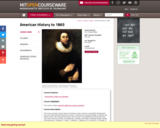
This course provides a basic history of American social, economic, and political development from the colonial period through the Civil War. It examines the colonial heritages of Spanish and British America; the American Revolution and its impact; the establishment and growth of the new nation; and the Civil War, its background, character, and impact. Readings include writings of the period by J. Winthrop, T. Paine, T. Jefferson, J. Madison, W. H. Garrison, G. Fitzhugh, H. B. Stowe, and A. Lincoln.
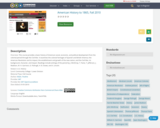
This course provides a basic history of American social, economic, and political development from the colonial period through the Civil War. It examines the colonial heritages of Spanish and British America; the American Revolution and its impact; the establishment and growth of the new nation; and the Civil War, its background, character, and impact. Readings include writings of the period by J. Winthrop, T. Paine, T. Jefferson, J. Madison, W. H. Garrison, G. Fitzhugh, H. B. Stowe, and A. Lincoln.
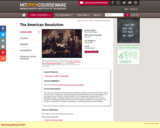
English and American backgrounds of the Revolution; issues and arguments in the Anglo-American conflict; colonial resistance and the beginnings of republicanism; the Revolutionary War; constitution writing for the states and nation; and effects of the American Revolution. Concerned primarily with the revolutionary origins of American government. Readings emphasize documents from the period -- pamphlets, correspondence, the minutes or resolutions of resistance organizations, constitutional documents and debates.
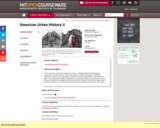
This is a seminar course that explores the history of selected features of the physical environment of urban America. Among the features considered are parks, cemeteries, tenements, suburbs, zoos, skyscrapers, department stores, supermarkets, and amusement parks. The course gives students experience in working with primary documentation sources through its selection of readings and class discussions. Students then have the opportunity to apply this experience by researching their own historical questions and writing a term paper.
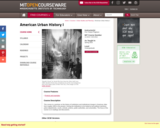
This course is a seminar on the history of institutions and institutional change in American cities from roughly 1850 to the present. Among the institutions to be looked at are political machines, police departments, courts, schools, prisons, public authorities, and universities. The focus of the course is on readings and discussions.
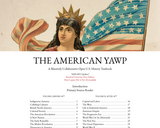
The American Yawp constructs a coherent and accessible narrative from all the best of recent historical scholarship. Without losing sight of politics and power, it incorporates transnational perspectives, integrates diverse voices, recovers narratives of resistance, and explores the complex process of cultural creation. It looks for America in crowded slave cabins, bustling markets, congested tenements, and marbled halls. It navigates between maternity wards, prisons, streets, bars, and boardrooms. Whitman’s America, like ours, cut across the narrow boundaries that strangle many narratives. Balancing academic rigor with popular readability, The American Yawp offers a multi-layered, democratic alternative to the American past.
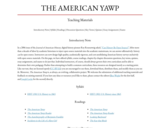
On this page, we have offered syllabi, course readings, chapter-by-chapter discussion questions, key terms, quizzes, essay assignments, and exams to do just that. Individual instructors, of course, should always govern their own curriculum and be able to determine their own pedagogy. Rather than attempting to build a common curriculum, these resources are designed merely as a starting point. Like our text, they are licensed openly (CC-BY-SA): you are encouraged to use them, download them, distribute them, and modify them as you see fit. Moreover, The American Yawp is, as always, an evolving, collaborative project. We welcome the submission of additional teaching materials and feedback on existing material. If you have any ideas or resources you’d like to share, please contact the editors (Ben Wright for the first half, and Joseph Locke for the second) directly.

In an increasingly digital world in which pedagogical trends are de-emphasizing rote learning and professors are increasingly turning toward active-learning exercises, scholars are fleeing traditional textbooks. Yet for those that still yearn for the safe tether of a synthetic text, as either narrative backbone or occasional reference material, The American Yawp offers a free and online, collaboratively built, open American history textbook designed for college-level history courses. Unchecked by profit motives or business models, and free from for-profit educational organizations, The American Yawp is by scholars, for scholars. All contributors—experienced college-level instructors—volunteer their expertise to help democratize the American past for twenty-first century classrooms.
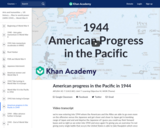
In 1944, the Americans (and Allies) make even more progress in the Pacific. By the end of the year, they have taken positions that put them within bombing range of Japan.
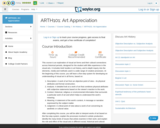
This course is an exploration of visual art forms and their cultural connections across historical periods, designed for the student with little experience in the visual arts. It includes brief studies in art history, and in-depth inquiry into the elements, media and methods used in a wide range of creative processes. At the beginning of this course, you will learn a five-step system for developing an understanding of visual art in all forms, based on:
1. Description: A work of art from an objective point of view – its physical attributes and formal construction.
2. Analysis: A detailed look at a work of art that combines physical attributes with subjective statements based on the viewer's reaction to the work.
3. Context: Historical, religious or environmental information that surrounds a particular work of art and which helps to understand the work's meaning.
4. Meaning: A statement of the work's content. A message or narrative expressed by the subject matter.
5. Judgment: A critical point of view about a work of art concerning its aesthetic or cultural value.
After completing this course, you will be able to interpret works of art based on this five-step system; explain the processes involved in artistic production; identify the many kinds of issues that artists examine in their work; and explain the role and effect of the visual arts in different social, historical and cultural contexts.
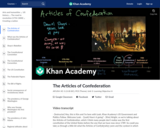
Before the United States had the Constitution, it had the Articles of Confederation, a much weaker government that lasted from 1777 to 1789. In this video, Kim and Leah discuss the pros and cons of the Articles, and the reasons they were discarded in favor of a new Constitution.
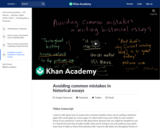
KA's historian Kim Kutz Elliott talks about strategies for improving your historical essays.
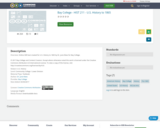
OER text created for U.S. History to 1865 by Dr. June Klees for Bay College.

Online OER text created for U.S. History 1865 to Present by Dr. June Klees for Bay College.
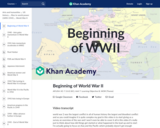
An overview of the run up to and very beginnings of World War II.
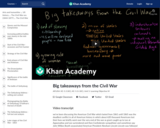
Why does the Civil War matter? Kim discusses the importance of the Civil War and its effects on American society.
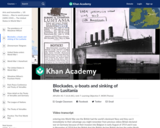
Learn about the naval warfare between Britain and Germany that led to the sinking of the Lusitania. Created by Sal Khan.
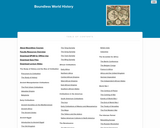
This is a world history survey course covering a wide range of civilizations.
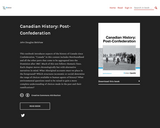
This textbook introduces aspects of the history of Canada since Confederation. “Canada” in this context includes Newfoundland and all the other parts that come to be aggregated into the Dominion after 1867. Much of this text follows thematic lines. Each chapter moves chronologically but with alternative narratives in mind. What Aboriginal accounts must we place in the foreground? Which structures (economic or social) determine the range of choices available to human agents of history? What environmental questions need to be raised to gain a more complete understanding of choices made in the past and their ramifications? Each chapter is comprised of several sections and some of those are further divided. In many instances you will encounter original material that has been contributed by other university historians from across Canada who are leaders in their respective fields. They provide a diversity of voices on the subject of the nation’s history and, thus, an opportunity to experience some of the complexities of understanding and approaching the past. Canadian History: Post-Confederation includes Learning Objectives and Key Points in most chapter sections, intended to help identify issues of over-arching importance. Recent interviews with historians from across Canada have been captured in video clips that are embedded throughout the web version of the book. At the end of each chapter, the Summary section includes additional features: Key Terms, Short Answer Exercises, and Suggested Readings. The key terms are bolded in the text, and collected in a Glossary in the appendix.